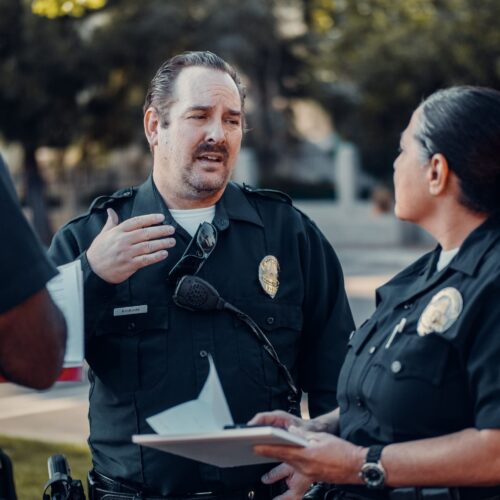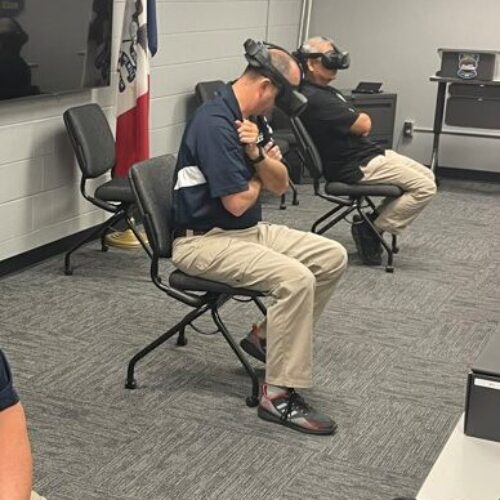
Q&A: How One Police Department Uses Data to Support Behavioral Health Responses
Responding to increasing numbers of mental health and substance use emergency calls, the New Castle County (DE) Police Department formed the Hero Help Addiction Unit and Mental Health Unit in 2016 and 2018, respectively. But seeing that their officers’ time and resources were still being consumed by lower level offenses rooted in mental health and substance use issues, they combined both units to form one larger, more efficient Behavioral Health Unit and instituted efforts using data to reduce their numbers of repeat encounters.
Now, with funding from a FY2019 Justice and Mental Health Collaboration Program (JMHCP) grant, the new unit has increased its statewide partnerships, hired additional clinicians to work alongside officers, and boosted officer buy-in. New Castle County officials credit these successes to the data-driven practices they have established. Staff at The Council of State Governments Justice Center spoke with Captain John Treadwell to learn how they’re using data to support their efforts and about their development of a cross-system database to further monitor and evaluate the unit.
What are some services your Behavioral Health Unit provides to people with behavioral health needs to help reduce repeat encounters for officers?
We offer a number of services, such as mental health assessments, treatment referrals, and follow-up to ensure continued and appropriate care. We also operate a co-response team and an addiction program that provides people with immediate access to a medical facility for assessment, individualized care plans for all levels of treatment, and case management that focuses on sustained recovery and accountability. All of these options are available regardless of whether someone has health insurance.
What data were important for you to capture, and how were they used to help identify gaps or concerns?
Our police department used a number of baseline metrics to identify gaps, such as the number of service calls, when those calls occurred, and which unit responded to the call. Specifically, for mental health related calls, the most important data we identified were the date and time of the calls. Once this was established, we were able to shift schedules to provide the greatest impact and tailor our responses. We also started tracking each facility’s treatment completion rate to help us monitor which facilities were offering our participants the greatest chance at recovery and further reducing their likelihood of reoffending.
How did your use of data help obtain officer and staff buy-in?
We included all our staff in the data development process from the beginning. Thus, buy-in was immediate. We learned that the better we understood the types of calls we were responding to, as well as the frequency—due to our use of data collection and analysis—the more we helped our unit save time and effort when handling calls for service. This not only improves the public’s perception of the program, it keeps our officers and staff invested because they know their work is not in vain. Combining our data practices with efforts such as roll-call training, sharing success stories, and recognizing officers in a public setting, also helps us continue shifting the culture on substance use disorders and mental illness. Officers are able to see that not everyone who has an addiction or a mental illness is a criminal who needs to be arrested.
You’re now developing a cross-system database. How do you expect this to further improve your efforts?
We realized a few years ago that a database would help us further the work we were doing, but we didn’t have everything in place then. Now, we can collect data that demonstrates to key stakeholders that the Behavioral Health Unit saves lives, money, time, and resources. We are also able to identify trends that inform effective strategy and appropriate resource allocation.
Looking forward, we expect the database to help us improve our ability to access critical information in a timely manner, de-escalate situations, and identify the most appropriate care. For example, if an officer encounters someone with a mental health history, we want to be able to get information to that officer quickly and give them individualized tips for de-escalating that person. This kind of streamlined information flow will allow mental health and substance use disorder staff more time to interact with participants and give us the ability to track and improve health outcomes.
Have you experienced any confidentiality or privacy issues while establishing the database?
We have not encountered any issues related to confidentiality or privacy. The police department has agreements with all our behavioral health partners that comply with federal, state, and local privacy laws. Additionally, the database is not available to police department staff outside of the Behavioral Health Unit. And for New Castle County police department staff who have access (even people who provide mental health related services), the database is restricted and controlled to ensure that people only see information applicable to their roles and responsibilities.
Photo by Patrick Mansell via Flickr.
ABOUT THE AUTHOR
********This application deadline has passed******** With support from the U.S. Department of Justice’s Office of…
Read MoreUnlike drug courts, which have been informed by national standards for 10 years, mental health courts (MHCs)…
Read More Building a Better Mental Health Court: New Hampshire Judicial Branch Establishes State Guidelines
Read More
Building a Better Mental Health Court: New Hampshire Judicial Branch Establishes State Guidelines
Read More
 Apply Now to Join a Community of Practice on Police-Mental Health Collaboration Staff Wellness
Apply Now to Join a Community of Practice on Police-Mental Health Collaboration Staff Wellness
With support from the U.S. Department of Justice’s Office of Justice Programs’…
Read More Empathetic Policing: Mason City Police Department Launches Virtual Reality Training Program to Help Officers Better Understand Behavioral Health Crises
Read More
Empathetic Policing: Mason City Police Department Launches Virtual Reality Training Program to Help Officers Better Understand Behavioral Health Crises
Read More
 Biden Signs Six-Bill Spending Package Funding Key Criminal Justice Programs
Biden Signs Six-Bill Spending Package Funding Key Criminal Justice Programs
On March 9, 2024, President Joe Biden signed a $460 billion spending…
Read More












